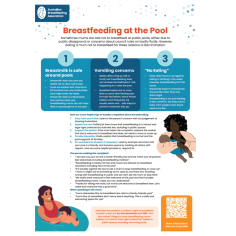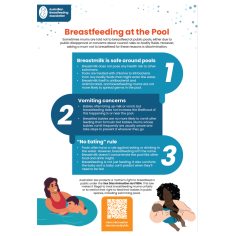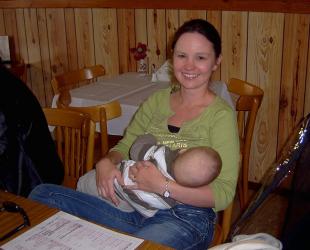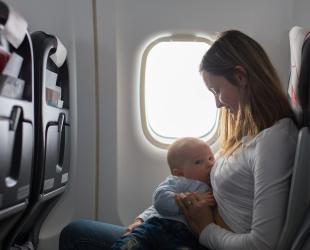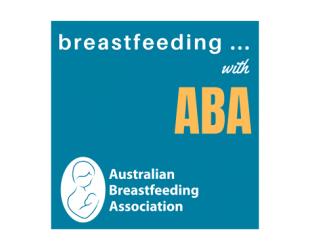Your baby has a right to be breastfed and you have the right to breastfeed wherever you are.
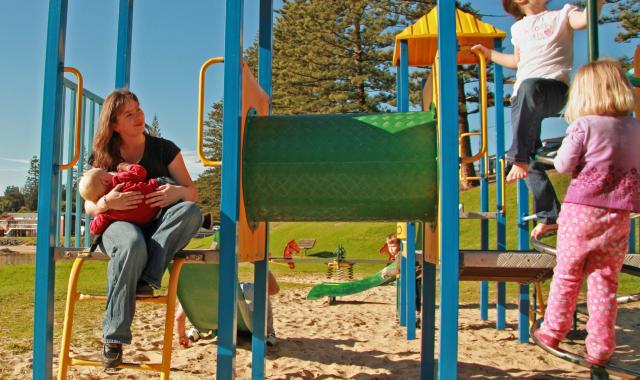
Breastfeeding is a natural and important way for mums to feed their babies, in Australia, every mother has the legal right to breatfeed her child in public. Whether you're at a park, shopping centre, restaurant or even on public transport, you can feel confident knowing that the law protects your right to breastfeed anywhere you're allowed to be.
Breastfeeding when out and about is convenient, it allows you to be flexible and you don't need to organise anything beforehand.
You will work out where and how to comfortably feed your baby when out and become more confident with time and practice.
If you are afraid that someone might comment about you breastfeeding in public, think ahead and plan a reply. This may include a breastfeeding fact or to state your legal right.
Most people understand that breastfeeding is important for mothers and babies. However, some may make critical remarks or confront you with unnecessary and illegal 'rules'. If this happens, it's okay to just say something like “We’re happy feeding here, thank you”.
Your legal rights
In Australian Federal Law breastfeeding is a right, not a privilege.
The Sex Discrimination Act 1984 makes it illegal for anyone to discriminate against a mother for breastfeeding in public.
This means that no one can ask you to stop, cover up or leave a public space while breastfeeding your baby or expressing.
These laws help create a supportive and inclusive environment for breastfeeding mums and their babies.
The Law protects your right to breastfeed
Frequently asked questions about breastfeeding in public
No.
It is illegal for anyone to ask you to leave, stop, or cover up while breastfeeding in a public space. The Sex Discrimination Act 1984 protects your right to breastfeed wherever you are legally allowed to be.
Stay calm and politely inform them that breastfeeding in public is your legal right. If you feel unsafe, find a secure place or person to help you.
You can also let the manager or a staff member know.
Yes.
You have the right to breastfeed your baby wherever you happen to be. This right is legally supported through the Sex Discrimination Act 1984. The requirements of a baby are different to those of an adult.
All mothers have the right to meet their baby's needs. A hungry baby shouldn't be expected to wait and no mother can be forced to ignore the needs of her baby.
Yes and No.
In Australia, refusing service or asking you to stop breastfeeding is discrimination under the Sex Discrimination Act 1984. This law makes it illegal to discriminate in areas like goods and services, accommodation, work or education.
In some situations, state or territory laws on harassment or prohibited conduct may make it illegal for someone to ask you to stop breastfeeding. However, outside these specific circumstances, there is no law that prevents a member of the public from telling you not to breastfeed. Importantly, there is no law in Australia that forbids a mother from breastfeeding. Even if someone asks you to stop, you have the legal right to continue breastfeeding wherever you are allowed to be.
No.
Baby Care Rooms are just a service for you to use if you want. You don't have to breastfeed in one if you don't want to. Some mums like the privacy or peacefulness of the Baby Care Room, but others prefer to breastfeed where they are.
If someone asks you to move to a Baby Care Room to breastfeed, remember that you have the right to breastfeed anywhere you feel comfortable. It's up to you to use one or not, and you don't have to move to the room.
Yes.
This sign doesn't apply to a baby who is breastfeeding. Use your common sense to decide. If the sign is just to keep the area clean, it's fine to breastfeed. But if the sign is because of chemicals or any danger, then it might not be safe to breastfeed there.
Yes.
Your rights to express are also protected under the Sex Discrimination Act 1984.
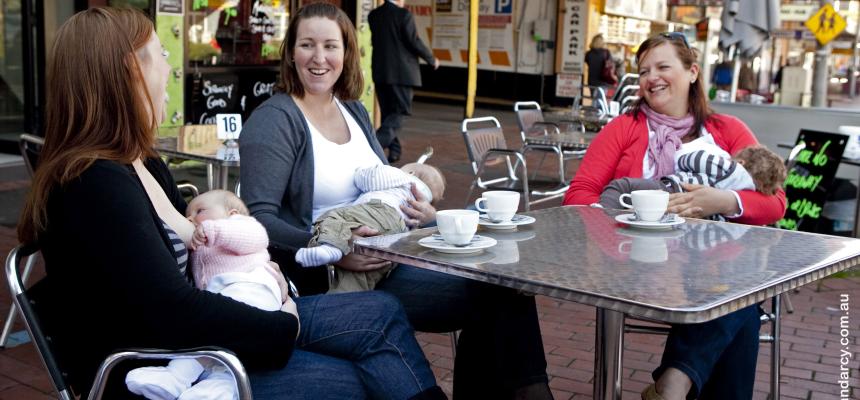

How to handle negative comments
Thankfully this doesn’t happen often. While most people are supportive, you may occasionally encounter someone who feels uncomfortable or makes a negative comment.
Remember, you have every right to breastfeed and you're doing an amazing job.
However, if it does, it can really reduce your confidence. If it has left you feeling upset, you may like to:
find emotional support through family and friends, your doctor and/or counselling
chat to an ABA breastfeeding counsellor
attend a local ABA group to gain support from other mums.
If you are ever in a situation where you are verbally or physically abused, this may constitute assault and is classed as a criminal act. In this situation, in addition to the above, you can also:
not respond to the aggressive behaviour and find a safe person or space
contact security or the police when possible and report the incident.
Arguments over breastfeeding in public places may give the message that breastfeeding is unnatural, undesirable or even illegal. This is not true. Don't forget that conflict and bad news are popular in reporting and more likely to make the media. If things are going along smoothly, that doesn’t make news. That's why you don't hear much about the many mothers who happily breastfeed at work, in shopping centres, in parks, in restaurants, on trains or just about anywhere, every day of the week without anyone knowing.
Breastfeeding at the pool
Sometime mums are told not to breastfeed at public pools. Usually this is because of public disapproval or due to council rules on bodily fluids around the pool. However, asking a mum not to breastfeed for these reasons is discrimination.
In 2011 a mother took such a complaint to the Human Rights Commission. As a result the management of the public pool had to apologise to the mother, change their policy and practices and have their staff trained.
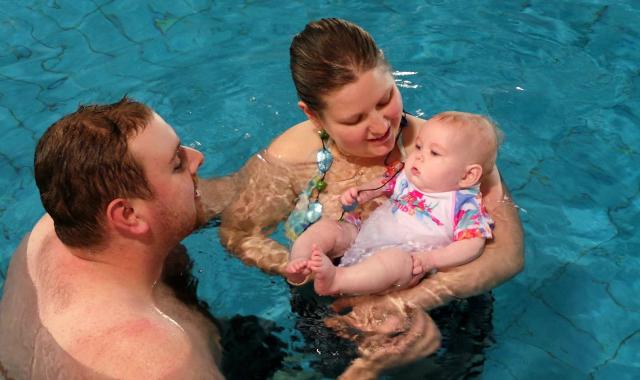
Here is some helpful information for you about breastfeeding in and around a public pool.
Breastmilk is safe around pools
Breastmilk does not pose any health risk to other swimmers.
Pools are treated with chlorine to kill bacteria from any bodily fluids that might enter the water.
Breastfeeding mums are able to swim even if their breasts leak milk
Vomiting concerns
Babies often bring up milk or vomit, but breastfeeding does not increase the likelihood of vomiting more than at other times.
Mums whose babies vomit frequently are usually aware and take steps to prevent it wherever they go.
Chlorine keeps the pool water clean.
'No Eating' rule
Pools often have a rule against eating or drinking in the water. However, breastfeeding isn't the same.
Breastmilk doesn't contaminate the pool like other food and drink might.
Breastfeeding is not just feeding. It also comforts the baby and a baby can't predict when they'll need to be fed.
Downloadable resources
A mum's story
My little girl was around 6 months and was sent home from day care with a cold. She was at a centre 5 minutes from work so I fetched her. However, I had a very important 2-hour meeting that afternoon, so I gave my colleagues the choice: me and baby, or no one! She fed/slept constantly on the breast for the whole meeting, which went very well.
No one particularly commented, other than to say, 'Wow, she was no bother'. The situation was initially outside my comfort zone but proved to be the best solution for everyone! I do love thinking back on the situation, as it was so unusual!
© Australian Breastfeeding Association January 2025
This information is as accurate as possible but is not intended to be relied on as legal advice.
